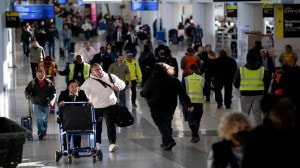“I am scared of spiders!”, ” I have Claustrophobia, I don’t like closed spaces” or “I am scared of heights”—You must have heard or used these phrases in your everyday life.
Phobias are often triggered by a specific object, place or, situation. It is important to highlight that unlike generalized anxiety disorder, people with a specific phobia are not consumed by pervasive worry and fear. However, living with phobias can be extremely challenging and it can seriously affect a person’s daily functioning and quality of life.
“Phobias are intense, irrational fears of something that pose little or no actual danger. They differ from normal fears in that the individual’s perception of the danger is unreasonable and leads to active avoidance behaviour. Phobias occur due to a combination of genetic, environmental, and psychological factors,” Dr Nimesh G. Desai, Independent Consultant in Psychiatry and Public Mental Health, former director, IHBAS Delhi told Financial Express.com.
They often emerge in childhood, with a median age of onset around 8 years, Dr. Desai revealed.
“Cultural factors also play a crucial role in the manifestation and severity of phobias. For instance, fears in Indian culture often relate to supernatural elements, animals, and natural environments, contrasting with Western fears that may focus on personal safety or social situations.
In children, specific phobias can be short-term problems that disappear within a few months. In adults, about 80 percent of new phobias become chronic (long-term) conditions that do not go away without proper treatment.
What is the prevalence of phobias in India?
In India, phobias are a significant aspect of anxiety disorders. The prevalence rate of phobias in India is estimated to be 4.2 percent, according to a meta-analysis of 13 psychiatric epidemiological studies.
According to Dr. Desai, this is lower than the global lifetime and 12-month prevalence rates of specific phobia, which are 7.4 percent and 5.5 percent respectively.
The National Mental Health Survey (NHMS) conducted in 2015-16 estimated that about 3.5% of the Indian population suffers from anxiety-related disorders, which translates to over 40 million individuals.
“Among these, agoraphobia was identified as the most common anxiety disorder, followed by generalized anxiety disorder,” Dr. Desai revealed.
The types of phobias seen in India are similar to those seen globally, including specific phobias (e.g., fear of spiders, heights, or flying) and social phobia (fear of social situations). Specific phobias reported in India include emetophobia (fear of vomiting), which has only one documented case, and blood-injury-injection phobia, which shows high comorbidity with depression.
In urban areas, social phobia and agoraphobia are more common, while in rural areas, animal phobias and natural environment phobias are more prevalent, Dr Aastha Dewan, Psychotherapist and Mental Wellness Coach told Financial Express.com.
‘Phobia as a syndrome is different from phobic symptoms’
The diagnostic and treatment challenges of phobias in India include lack of awareness, stigma associated with mental health issues, and limited access to mental health services.
According to Dr. Desai, cultural factors can influence the presentation of phobias and other mental health disorders, which can complicate diagnosis and treatment.
“Phobia as a syndrome is different from phobic symptoms which can be part of other disorders. For instance, a study in Uttar Pradesh noted that individuals with agoraphobia often developed these symptoms following alcohol dependence, indicating a complex interplay between substance use and anxiety disorders,” he told Financial Express.com.
According to a report by Havard Medical School, phobia can increase an adult’s risk of other types of psychiatric illness, especially other anxiety disorders, depression, and substance abuse.
‘Society often builds a negative scenario around phobias’
Patients with phobias in India face several challenges, including social stigma, lack of understanding from family and friends, and limited access to effective treatments.
Society often builds a negative scenario around phobias, and people may make fun of those suffering from them, Dr. Desai explained.
“Improving the situation requires increasing awareness about phobias and other mental health conditions, reducing stigma, and expanding access to mental health services. Research indicates that females are more likely to be affected by anxiety disorders, including phobias, than males. The prevalence of anxiety disorders is notably higher among younger populations, particularly those aged 18 to 29 years,” he told Financial Express.com.
How phobias are treated?
Treatment options for phobias in India include cognitive-behavioral therapy (CBT) and medication. “CBT, which is often greater at exposure, can be in vivo (exposure to the actual situation) or in vitro (imaginal exposure). Flooding, a type of exposure therapy, can also be effective,” Dr. Desai informed.
He also highlighted that phobias are often associated with other mental disorders, such as other anxiety disorders and depression.
“Agoraphobia, for example, is often associated with panic attacks. The fear and avoidance associated with phobias can lead to significant distress and impairment, which can contribute to the development of other mental health conditions,” he said.
Usually, people only need to be in treatment for six to 12 sessions. In some cases, people may need to opt for intensive, single-session treatments. Some psychiatrists might also prescribe a short-acting anxiety medication like beta-blockers and sedatives to control your symptoms for a short period of time, in some cases.
In recent year, researchers are working towards finding new ways to treat phobias and go beyond CBT. In 2022, a report by Horizon, The EU Research and Innovation Magazine, revealed Professor Merel Kindt at the University of Amsterdam is working on conjuring memories associated with fear and using them to treat phobias and PTSDs.
“She believes that her ‘recall and erase’ strategy can be used to treat all sorts of phobias, but also life-changing clinical conditions such as post-traumatic stress disorder (PTSD),” the report revealed.
Another report by Scientific American revealed that some researchers are also working towards more intensive forms of CBT for childhood anxiety disorders but for shorter duration. Around the U.S. and Europe, short-course therapies for anxiety disorders are becoming popular in both adult and child psychology.
Dr Dewan informed that hypnosis therapies are also becoming popular as alternative therapy treatment for phobias along with medication. According to the National Institute of Mental Health, about 75% of people with specific phobias overcome their fears through cognitive-behavioral therapy, while 80 percent of those with social phobia find relief from medication, cognitive-behavioral therapy, or a combination.
It’s important to remember that phobias are common and treatable, Dr. Desai emphasised.
“If you or someone you know is struggling with a phobia, seek help from a mental health professional. Early intervention can significantly improve outcomes. Despite societal misconceptions and remember this phobias are not a sign of weakness,” he told Financial Express.com.
DISCLAIMER: If you or someone you know is struggling with their mental health or in distress contact the Vandrevala Foundation’s helpline (+91-9999666555) which is available in 11 languages including English and can be accessed via telephone or WhatsApp 24×7. You can also contact Fortis Hospital’s National Helpline number 91-8376804102 which is available 24×7. You can also contact the Government Mental Health Rehabilitation Helpline ‘KIRAN’ at 18005990019 which is available 24×7.







